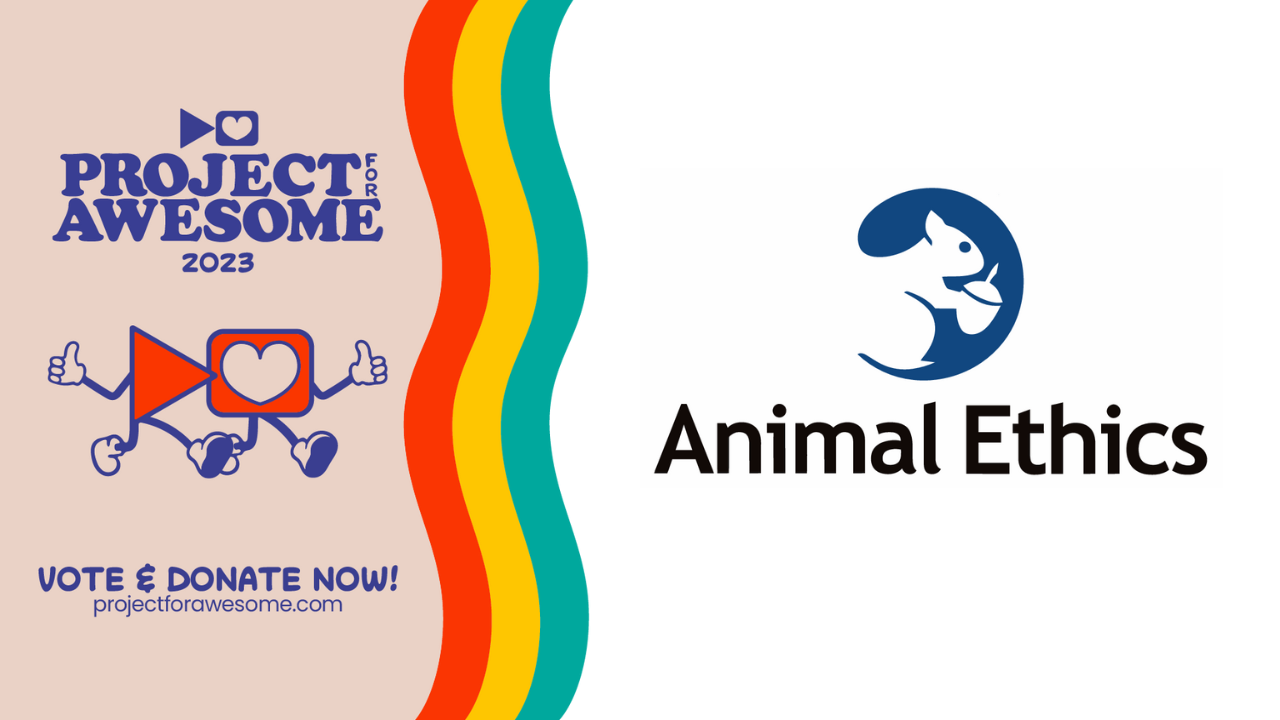All we need is your vote today for Project for Awesome
 Animal Ethics is currently participating in the Project for Awesome charity drive. People submit short videos in support of charities and then everyone votes on them over a two day period. Please vote for our videos if you can, and ask others to as well! Voting is open until Sunday, February 19 at 12:00 noon EST (5:00 PM UTC).
Animal Ethics is currently participating in the Project for Awesome charity drive. People submit short videos in support of charities and then everyone votes on them over a two day period. Please vote for our videos if you can, and ask others to as well! Voting is open until Sunday, February 19 at 12:00 noon EST (5:00 PM UTC).
Project for Awesome video page for Animal Ethics.
Please vote for all 16 videos on our page. Votes across all videos are added up, and the charities with the highest number of votes will receive the funds raised during the Project for Awesome event.
The videos in support of Animal Ethics are all informative and interesting. They represent us well, so here is an overview of the contents of the Project for Awesome videos, in the words of the participants.
Some animals we love. Others we treat like trash, while others we simply ignore. When we think about the reasons why we help humans in need, in most cases we help them just because they need it. Yet we act differently towards animals. For them, their life experiences are just as important as mine are to me or yours are to you. This is why we should take wild animal suffering seriously and act accordingly.
How often do you think about wild animals or what their lives are actually like? We don’t really pay attention to the welfare of wild animals.
Most animal suffering takes place in the wild, and most harms to wild animals are natural harms, like hunger and diseases. We should help them whenever we can, even when we are not the ones harming them.
Animal Ethics works to raise awareness about speciesism, animal sentience, and the situation of all animals. Their vision is a world where all sentient beings are given moral consideration. Their goal is to raise concern for all sentient beings. They are one of the very few organizations in the world working to help animals in the wild. They support interventions that help these animals such as vaccinations and helping animals in natural disasters. And they promote research to learn how to do more using safe technologies. Many of these have already been used for several decades including still images, videos, and audio recordings.
Animal Ethics works to help all sentient beings, whether they exist now or in the future. This means they take a longtermist approach which considers the impact of our actions on the long-term future. The pain an animal will suffer in the future hurts just as much as the same pain in an animal today.
There are some areas where wild animal suffering could increase astronomically in the future if we fail to address them now, such as the consumption of invertebrate animals or marine animals raised in fish farms.
They focus on changing attitudes, which can have long-term positive impact. They also ally with other groups that have a similar mission, strengthening their efforts. They do activism around the world. This work is critical because as societies we need to research and think about ways that we can build a future that benefits all sentient beings. Animal advocacy is an underrated and underfunded cause area, especially when we take a long-term approach.
Animal Ethics gives talks, conferences, and courses for students, animal advocates, and lawyers. There’s also a video course for the general public available on YouTube. This is in addition to producing hundreds of short videos every year and some longer videos too. Animal Ethics has a lot of detailed information on their website, currently available in 10 languages and still growing. In their classes, they give shorter and simpler introductions to the topics. All of these materials are available for free for anyone who wants to help animals in very different ways.
This is all done on a small budget with many volunteers all over the world.
That’s awesome.
Keep being awesome.